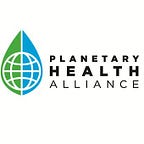Raquel de Andrade Cardoso Santiago Spotlights Modi Mwatsama
by Raquel de Andrade Cardoso Santiago, Travel Scholar and Speaker Ambassador at the 2019 Planetary Health Annual Meeting
The 2019 Planetary Health Annual Meeting was an amazing experience, and I had the honor to share information, scientific evidence, and insights with very dedicated people in different competencies. One of them was Dr. Modi Mwatsama, a nutritionist, senior policy adviser, and advocate on food systems, sustainable development, and global health. Dr. Mwatsama has a Doctorate in Public Health, is an Honorary Assistant Professor at the London School of Hygiene and Tropical Medicine, and she was formerly Director of Policy and Global Health at the UK Health Forum, where she led their policy research and advocacy on non-communicable disease prevention across UK, European, and UN institutions. Among her food-system-related achievements, Modi helped to secure the inclusion of sustainability considerations within the UK Government’s Eatwell Guide to healthy eating and win health-promoting changes to the EU Common Agriculture Policy.
As Senior Scientist, nowadays she leads the Wellcome Trust’s Our Planet, Our Health Programme’s research, partnership, and policy work on food systems, nutrition, and health. She currently sits on the boards of the EAT Forum, Association for Nutrition, and Sustain: The Alliance for Better Food and Farming. She has served on several national advisory committees including Public Health England groups on dietary guidelines, sugar, nutrient profiling, and global health.
During the Planetary Health Annual Meeting, I have had a great learning opportunity as a Speaker Ambassador with Dr. Mwatsama. During the time we shared, we talked about the Dietary Guidelines for the Brazilian Population and her experience on food systems. We discussed the importance of increasing the consumption of healthy foods such as fruits, vegetables, legumes, and nuts, and the reduction of less healthy foods such as added sugars and red meat, always in accordance with each context and within local and regional realities. Another important topic was that both scientists and the general population need a better understanding of the fact that the sustainability of the global ecosystem and of agriculture in particular is dependent on biodiversity conservation and utilization. The latter could potentially serve as tools for improving food and nutrition security.
In addition, during Dr. Mwatsama’s session, “Food systems and dietary pathways to NCD prevention,” she presented about the non-communicable disease (chronic disease) burden, planetary boundaries for a sustainable food system, and the importance of translating the world reference diet based on global averages into country-specific contexts. This will require integrated food system action in order to ensure solutions to both environment and health, in a sustainable pace and scale by the development of evidence on the priority diet interventions.
Read more:
https://wellcome.ac.uk
https://eatforum.org
http://www.b4fn.org
Disclaimer: The views and opinions expressed in this article are those of the author and do not necessarily reflect the position of the Planetary Health Alliance or its members.
